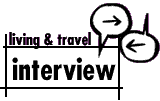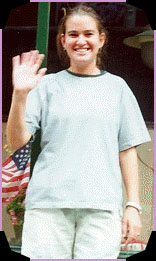

Spike Gillespie
interviewed by Emma Taylor on August 22, 1996

"For every article published, there are at least a thousand people who a) say "I could've written that" and b) didn't."
Spike Gillespie's first big breaks were writing for Tampax and "Playboy;" she is now a frequent contributor to publications both online and print (Salon, Word, "GQ," "Cosmopolitan," "Elle," "Might"...), and is working on her memoir for Simon and Schuster. Here, she explains how she became a writer and offers tips for the would-be writer.
Tripod: How did you become a writer?
Spike Gillespie: There's actually a link on my site to an essay I wrote called "My Life as a Writer." It details how I started winning goofy essay contests (which I took very seriously) in fifth grade (which is how I learned to associate writing with money), and continued on -- 24 years now -- with writing. I've been writing since I was 8 and published since I was 19. But don't let that "child prodigy spin" fool you. My self-esteem was in the crapper for many, many years during which time I spent more energy drinking than writing. I only came out of that a few years ago and 1996 is actually the first year I didn't live on credit cards.
Beyond that "how" is a tough question. Some people buy into the tortured artist theory, others don't. Personally, my dad treated me like a pain in the ass my whole life. That bummed me out immensely, and writing has been extremely cathartic for me. Sadly, I'm apparently not alone. The essays I write that get the best/most responses are the ones about my dad.
Tripod: Do you think of yourself as an online writer?
SG: Long before I was an online writer, I was a writer terrified of computers. I worked on an archaic word processor that printed stuff so loud and so slow that it took me 13 hours to print my (never published) novel. Ugh. Anyway, I am often called an online writer, and I don't mind, but pretty soon you can add "book author" to the list, and I hope to do more print stuff next time I get a moment to breathe.
Tripod: If you were to advise someone trying to make it as a freelancer, what advice would you give? Would it be any different if the freelancer were male or female?
SG: Same advice for men or women: write. Write a lot. And send it out. Don't say, "Well, I'll go to college, then get a master's from J-school, then look for a job." People who make it in this business -- who make it full-time -- are a rare breed. You have to basically not only be able to write well, but be able to shove yourself down the throats of editors who are known to throw unsolicited articles, manuscripts, and query letters in a heap in the corner, or worse, the trash. For every article published, there are at least a thousand people who a) say "I could've written that" and b) didn't.
You don't need a degree to be a writer. Outside of required freshman classes and a couple of others (like tech writing) to meet my Lit requirements, I had no formal training. So technically, I am not degreed -- not in journalism. I got my start by writing a letter to the editor of the school paper. It was good enough to run as a column, which led to a regular column. I sent those clips out all over the place and got rejected like crazy. Then, I took an internship with a magazine company and made a million contacts. We're scattered all over the country now, but I still get lots of work from those people I met ten years ago, or from people they introduced me to.
That's the key, contacts. If you can land an internship at a magazine in New York, at a big company like Conde Nast or Hearst, chances are you'll make a lot of contacts. But be prepared to live sparingly-- some internships pay absolutely nothing.
Anyway, once you have contacts, you have to just be persistent. You have to take crap work for crap pay. You get rejected. You get lonely. You feel crazy sometimes. You apply for jobs dishwashing. You get depressed. Then you get a break. And often, this cycle repeats. Some people scoff newspaper work and online work (which pays really, really badly usually), and some people would say the higher you shoot, the more you'll score so don't settle for little assignments. It's been my experience that taking what you can get, while you hone your writing skills and develop a distinct style, is a good thing. Anyone can write little profiles, little reports. If you want to stand out as a writer, you have to come up with a signature voice. But, until you can do that, well you're going to have to write those little profiles and reports if you want to eat and keep your electricity on.
In my case, I've been doing this first person stuff for 13 years, while simultaneously waitressing, bartending, and writing reportorial pieces. Now, I stand a chance of overnight sensation because, thanks to people like Mary Karr and Anne Lamott, first-person, memoir-style is hot. And then, if I do make it, people will say, "Oh, she's just ripping off so-and-so." I don't care. I know I've been doing this forever and besides, that's not the real point. The point is I want to tell my story and I want people to listen and if that means comparisons, well compare me already.
